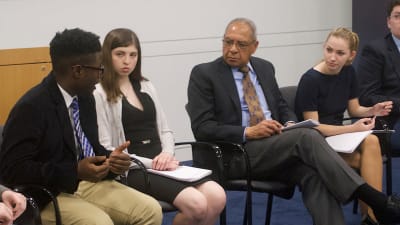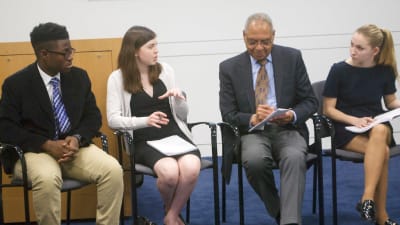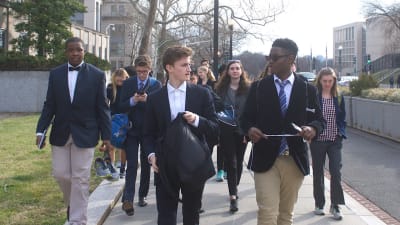Ghosts of Rwanda Night
“Ghosts of Rwanda Night” is a sober SEGL tradition. Since our first semester, the powerful PBS Frontline documentary has saddened, focused, and challenged our students. What is the best response to mass atrocities? Should American leaders always prioritize American interests, or is it worth risking American lives to help stave off tragedy abroad? How do we prevent such human rights abuses from ever occurring? Ghosts, and our second case study of the semester, poses these questions.
On Friday evening we watched the documentary together in our West dormitory common room. The discussion that followed was intense, sorrowful, and forward-looking. Many students continued their conversations in dorm rooms long into the night, and meditated on the film in weekly English journal entries.
Three of the leaders featured in the documentary are longtime SEGL guest speakers, and we met with two of them this week.
Carl Wilkens is a former Adventist missionary who was the head of his church’s relief mission in Rwanda during the genocide. He was the only American to stay behind in 1994, and is most well-known for (among other acts) saving an entire orphanage from Interahamwe machetes. To SEGL graduates, he is a winner of our coveted “Golden Mug” award, which our graduates give to the speaker who has made the biggest difference in their lives. (Carl is also an honorary SEGL teacher; twice he has co-led a group of our students to Rwanda. To learn more about our 2015 trip–we will almost certainly return–visit our SEGL in Rwanda page!)
Wilkens videoconferenced from the road (he plans to visit DC later this semester). He is the founder of World Outside My Shoes, a genocide prevention NGO that travels the country speaking to schools, universities, and others. The students asked him a wide range of questions–some personal, some political–and listened intently as he carefully and thoroughly addressed each one.
On Wednesday, we trekked to the United States Institute of Peace to hear from Ambassador George Moose and the USIP staff, which introduced the Institute to students. Moose was Assistant Secretary of State for African Affairs during the genocide. Moose helped students appreciate the bureaucratic decision making hurdles that stymied attempts to intervene. More important, he helped students see the legitimate reasons governments do not want to intervene in such conflicts. (Our visit coincided with a film crew from “Fox News Sunday with Chris Wallace,” which was doing a piece on USIP. We’ll see if our students make it into the piece this weekend!)
(The third longtime SEGL guest speaker featured in the film is current UPS Vice President for Global Affairs Laura Lane. Although Lane no longer speaks publicly about her time in Rwanda, she gave a TED talk in 2015 that is very similar to the story she has told countless SEGL graduates. You can view that talk here.)
On Friday afternoon, we traveled to the Rwandan Embassy and met with lead officials there who shared information about Rwanda’s reconciliation attempts, the nation’s current challenges, and the officials’ personal stories. At the end of the visit Mathilde Mukantabana, the Rwandan Ambassador to the U.S., stopped by for a few words and pictures. We rounded out this case study with a Saturday visit to the U.S. Holocaust Memorial Museum, where–thanks to USHMM administrator and SEGL trustee Jesse Nickelson–we had a special tour.
The week also brought several other highlights. For example, on Thursday evening, most of our students chose to attend a special conversation with the parents of Trayvon Martin. Thanks to the generosity of longtime SEGL guest speaker (and owner of local independent bookstore Politics and Prose) Lissa Muscatine, the students had reserved front row seats. Many of the issues discussed that evening sparked conversations that have continued for the past several days. We also enjoyed the first edition of our Books and Basketball community service project (more on that in a future post), our first student-led School Meeting, and much discussion about the Trump Administration’s latest doings.
Next up: our non-profit case study, which will begin to prepare students for their social venture capstone.














